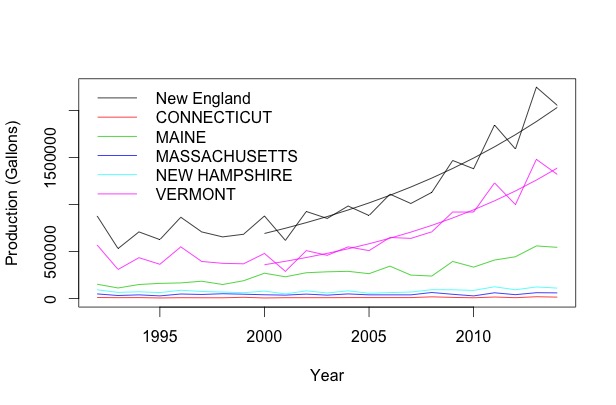In September I began a 1-year fellowship at Harvard Forest. The Bullard Fellowship program enables mid-career scientists the opportunity to pursue research or other activities on forest related topics. During my fellowship, I will study the interactive effects of climate, land-use, and intensified sugar bush management on the New England maple syrup industry.
The cultural and economic importance of sugar maple is nearly unrivaled in eastern North America. Its lumber commands a premium price, its foliage provides an unparalleled display of fall color, and it is widely planted both within and beyond its range as a street tree; the iconic New England village green would not be the same without it. Sugar maple’s most unique use, however, is that it provides the raw material for maple syrup, one of the few wild-harvested agricultural products in North America. Tapping maple trees to collect their sap has a long-history, and “sugaring” is part of the cultural fabric of New England. Maple syrup production is also making an economic comeback. United States syrup production peaked before the Civil War at 6.6 million gallons per year, and then began a long decline that lasted until the turn of the 21st century (average annual production in the 1990s was 1.3 million gallons). In the last decade and a half, however, syrup production in New England increased at 8-10% per year, fueled in part by increasing demand aided by the organic and local food movements. There is more room for expansion. While Quebec, the global leader in maple syrup production, currently taps 35% of its maples, only ~1% of tappable maples are actually used for syrup collection in New England. But if current trends continue, New England could match Quebec’s utilization rate in 30-50 years. All is not rosy for maple sugaring in New England, however. Recent reports have singled out sugar maple as being especially sensitive to climate change. How will climate change affect the industry, and how might increased management for maple sugaring interact with climate change to affect the regions forests?
As a Bullard Fellow at the Harvard Forest, I will collaborate with Jonathan Thompson and Matthew Duveneck, to use the LANDIS-II forest landscape model to develop and model scenarios of intensified sugar bush management in New England to explore how increased maple syrup production might affect the composition and structure of the region’s forests. I will also use this modeling framework and empirical approaches to explore the resiliency of the maple syrup industry to climate change.
